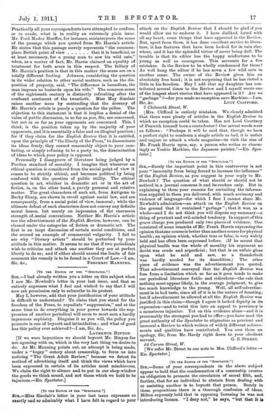[To THE EDITOR OF THE " SPECTATOR. "] Sin,—Surely the important
point in this controversy is not your " immunity from being forced to increase the influence" of the English Review, as you suggest in your reply to Mr. Newbolt P The question of what should or should not be noticed in a journal concerns it and its readers only. But in explaining to them your reasons for curtailing the informa- tion supplied to them you delivered, with much acrimony and violence of language—for which I fear I cannot share Mr. Newbolt's admiration—an attack on the English Review on the ground that it contained " garbage " ; that it was, as a whole—and I do not think you will dispute my summary—a thing of prurient and evil-minded tendency. In support of this grave charge you produced only two pieces of evidence. One consisted of some remarks of Mr. Frank Harris expressing the opinion thatone course is better than another course for physical health; an opinion which, whether true or false, is very widely held and has often been expressed before. (If he meant that physical health was the whole of morality his argument no doubt was crude and superficial ; but that is an unfair gloss upon what he said and saw, so a thunderbolt was hardly needed for its demolition.) The other piece of evidence was the advertisement you quoted. That advertisement conveyed that the English Review was free from a limitation which so far as it goes tends to make our periodical literature futile and ridiculous—the rule that nothing must appear likely, in the average judgment, to give too much knowledge to the young. Well, all self-advertise- ment is in bad taste, since all of it is in the nature of boasting; but if advertisement be allowed at all the English Review was justified in this claim—though I agree it lacked dignity in its expression—and to twist this into an appeal to pruriency is a monstrous injustice. Yet on this evidence alone—and it is presumably the strongest you had to offer—you have used the great authority of the Spectator to stigmatize as prurient and immoral a Review to which writers of widely different achieve- ments and qualities have contributed. You owe them an apology, Sir, from Mr. Hardy right down to your obedient [We refer Mr. Street to our note to Mrs. Clifford's letter.— ED. Spectator.]














































 Previous page
Previous page